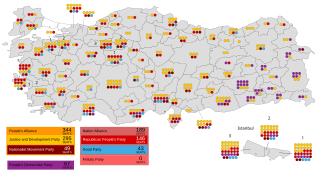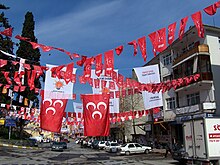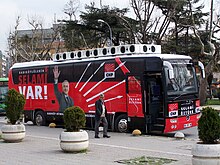
The Felicity Party is an Islamist Turkish political party. It was founded in 2001, and mainly supported by conservative Muslims in Turkey.

The Nationalist Movement Party is a Turkish far-right, ultranationalist political party. The group is often described as neo-fascist, and has been linked to violent paramilitaries and organized crime groups. Its leader is Devlet Bahçeli.

The multi-party period of the Republic of Turkey started in 1945.

The Democratic Society Party was a Kurdish nationalist political party in Turkey. The party considered itself social-democratic and had observer status in the Socialist International. It was considered to be the successor of the Democratic People's Party (DEHAP). The party was established in 2005 and succeeded in getting elected more than ninety mayors in the municipal elections of 2009. On 11 December 2009, the Constitutional Court of Turkey banned the DTP, ruling that the party has become "focal point of activities against the indivisible unity of the state, the country and the nation". The ban has been widely criticized both by groups within Turkey and by several international organizations. The party was succeeded by the Peace and Democracy Party.

General elections were held in Turkey on 3 November 2002 following the collapse of the Democratic Left Party–Nationalist Movement Party–Motherland Party coalition led by Bülent Ecevit. All 550 members of the Grand National Assembly were up for election.

General elections were held in Turkey on 22 July 2007 to elect 550 members to the Grand National Assembly. Originally scheduled for November, the elections were brought forward after parliament failed to elect a new president to replace Ahmet Necdet Sezer. The result was a resounding victory for the incumbent Justice and Development Party (AKP), which won 46.6% of the vote and 341 seats. The party's leader Recep Tayyip Erdoğan was consequently re-elected as Prime Minister of Turkey. The opposition Republican People's Party (CHP) came second with 20.9% of the vote and took 112 seats. The Nationalist Movement Party (MHP), which had failed to surpass the 10% election threshold in the 2002 election, re-entered parliament with 14.3% of the vote and 71 MPs. The election was fought mostly on Turkey's debate over laïcité that had been perceived to be under threat from the AKP's nomination of Foreign Minister Abdullah Gül, an Islamist politician, for the Presidency. Developments in Iraq, secular and religious concerns, the intervention of the military in political issues, European Union membership negotiations, the United States and the Muslim world were other main issues.

The Turkish local elections of 2004 were held throughout the eighty-one Provinces of Turkey on 28 March 2004 in order to elect both mayors and councillors to local government positions. All 16 metropolitan and 3,193 district municipalities were up for election, while 3,208 provincial and 34,477 municipal councillors were also elected. More than 50,000 neighbourhood presidents (muhtars) were also elected, though these do not have any political affiliations.

General elections were held in Turkey on 12 June 2011 to elect the 550 members of Grand National Assembly. In accordance to the result of the constitutional referendum held in 2007, the elections were held four years after the previous elections in 2007 instead of five.
The outcome (in %) of the Turkish local elections after 1980 is shown below.. In the local elections in addition to mayors and muhtars, members of local parliaments are elected. The voter base of the local parliaments and the national parliament is assumed to be identical. In the table, only those parties which received more than 1% are shown.
The December 2009 Kurdish protests in Turkey were five days of protests in Turkey that ensued after a December 11, 2009 ruling by the Constitutional Court of Turkey that banned the pro-Kurdish Democratic Society Party (DTP), after finding them guilty of having links to the outlawed Kurdistan Workers' Party (PKK) and spreading "terrorist propaganda."

General elections were held in Turkey on 7 June 2015 to elect 550 members to the Grand National Assembly. This was the 24th general election in the history of the Turkish Republic, electing the country's 25th Parliament. The result was the first hung parliament since the 1999 general elections. Unsuccessful attempts to form a coalition government resulted in a snap general election being called for November 2015.

Local elections were held in Turkey on 30 March 2014, with some repeated on 1 June 2014. Metropolitan and district mayors as well as their municipal council members in cities, and muhtars and "elderly councils" in rural areas were elected. In light of the controversy around the elections, it was viewed as a referendum on the government of Prime Minister Recep Tayyip Erdoğan. About 50 million people were eligible to vote.
This is a list of all political parties eligible and intending to contest the Turkish general election of June 2015. Parties wishing to contest were required to send a full list of their candidates to the Supreme Electoral Council of Turkey by 17:00 local time on April 7, 2015. 20 of the 32 eligible parties submitted candidate lists. A full list of all political parties in Turkey is available here.

General elections were held in Turkey on 1 November 2015 to elect 550 members to the Grand National Assembly. They were the 25th general elections in the History of the Republic of Turkey and elected the country's 26th Parliament. The election resulted in the Justice and Development Party (AKP) regaining a parliamentary majority following a 'shock' victory, having lost it five months earlier in the June 2015 general elections.

Parliamentary elections were held in Turkey on 14 May 2023, alongside presidential elections, to elect all 600 members of the Grand National Assembly. The incoming members formed the 28th Parliament of Turkey. The elections had originally been scheduled to take place on June 18, but the government moved them forward by a month to avoid coinciding with the university exams, the Hajj pilgrimage and the start of the summer holidays. Prior to the election, the electoral threshold for a party to enter parliament was lowered from 10% to 7% by the ruling party.

The Turkish local elections of 2019 were held on Sunday 31 March 2019 throughout the 81 provinces of Turkey. A total of 30 metropolitan and 1,351 district municipal mayors, alongside 1,251 provincial and 20,500 municipal councillors were elected, in addition to numerous local non-partisan positions such as neighbourhood representatives (muhtars) and elderly people's councils.

The Good Party is a nationalist, Kemalist and conservative political party in Turkey, established on 25 October 2017 by Meral Akşener. The party's name and flag is a reference to the tamga of the Kayı tribe.

Parliamentary elections were held in Turkey on 24 June 2018 as part of general elections, with presidential elections taking place on the same day. Originally scheduled for 27 October 2019, President Recep Tayyip Erdoğan called snap elections on 18 April after months of speculation. With the passage of a series of constitutional amendments in the 2017 referendum, the number of MPs will be increased from the previous 550 to 600. These representatives will be elected by the constituents of the 87 electoral districts of Turkey by party-list proportional representation.
The Republican People's Party was founded in 1919 during the Sivas Congress.

The Kurdish Political Movement or the Kurdish Liberation Movement, refers to the movement that seeks to realize the political demands of Kurdish people living in the geocultural region called Kurdistan in the lands of Turkey, Iraq, Syria and Iran, such as education in their native language, self-determination, autonomy or an independent state. In the context of Turkey, this movement is being pursued by democratic means through left-wing ethnic political parties, as well as through PKK affiliated militant groups.






















